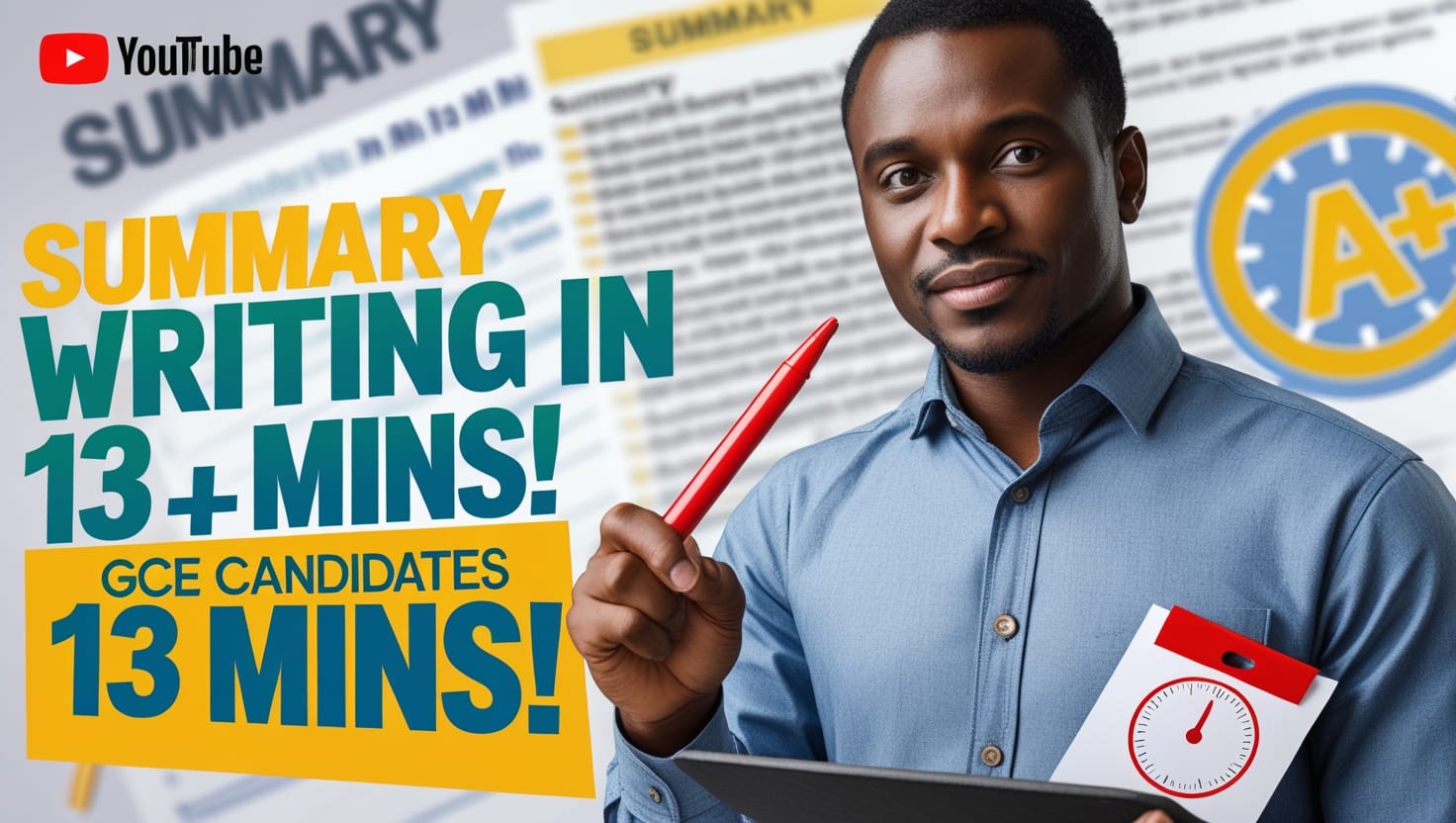Do you struggle with summary writing in your English exams? You’re not alone. Many GCE candidates lose valuable marks—not because they don’t understand the passage, but because they don’t know how to summarise effectively.
In this article, I’ll show you how to master summary writing in just 10 minutes. Whether you’re writing in note form or prose, you’ll learn simple, exam-ready strategies that can boost your marks and your confidence.
What Is Summary Writing?
Let’s begin with the basics.
A summary is a shortened version of a longer text. Your job is to extract the key points and present them clearly and briefly. It’s not about rewriting the whole passage—it’s about condensing important ideas using your own words.
In GCE English, summary writing tests how well you:
- Understand information
- Organise ideas
- Express yourself concisely
A good summary shows that you can read, think, and write with clarity.
2. Types of Summaries in the GCE Exam
In your GCE exam, you may be asked to write:
- A Note Form Summary – where you list the key points using bullets or numbers
- A Prose Summary – where you write a paragraph using full sentences
Sometimes the examiner will ask for one; sometimes both. Knowing the difference—and how to write each—is essential for exam success.
3. How to Approach a Summary Question
Here’s a step-by-step method to help you tackle any summary question with confidence:
✅ Step 1: Read the Question Carefully
Understand what the examiner is asking. Are you summarising causes, effects, or advantages? The focus matters.
✅ Step 2: Skim the Passage
Read quickly to get the general idea. Identify the topic and tone without worrying about the details just yet.
✅ Step 3: Reread and Highlight
Go back and read carefully. Underline or highlight the key points that answer the summary question. Skip over examples, repeated ideas, or side information.
✅ Step 4: Eliminate Irrelevant Details
Keep only what is essential. Your job is to simplify, not rewrite everything.
This method helps you focus your writing and avoid unnecessary information.
4. Writing the Note Form Summary
In a note form summary, each point should be:
- Short
- Clear
- To the point
You don’t need full sentences. Here’s an example based on the topic:
“Summarise the benefits of regular exercise.”
Note Form Summary Example:
- Improves blood circulation
- Boosts mental health
- Strengthens muscles and bones
- Reduces risk of diseases
- Increases energy levels
- Helps manage weight
- Enhances sleep quality
That’s it! No long explanations—just the facts. Stick to the required number of points, usually six or seven.
5. Writing the Prose Summary
Now let’s look at the prose summary. This version uses full sentences in a single paragraph. You’re still summarising the same points, but this time with flow and sentence structure.
Here’s how you might write it:
Prose Summary Example:
Regular exercise offers many health benefits. It improves blood circulation, strengthens muscles and bones, and reduces the risk of various diseases. In addition, it boosts mental health, increases energy levels, improves sleep, and helps in managing weight.
Keep your writing clear, connected, and concise. Avoid repeating ideas or using complex vocabulary. One paragraph is enough.
6. Common Mistakes to Avoid
Even strong students lose marks because of these common mistakes:
❌ Copying long sentences from the passage
❌ Including unnecessary examples or explanations
❌ Using casual or unclear language
❌ Writing too much—or too little
❌ Repeating the same idea in different words
To impress examiners, keep your summary original, brief, and accurate.
7. Final Checklist for Summary Success
Here’s a quick checklist to guide your writing in the exam:
✔️ Read the question carefully
✔️ Identify and underline key points
✔️ Focus on the part of the passage that answers the question
✔️ Write clearly, briefly, and logically
✔️ Follow the required format: note form or prose
✔️ Stick to the word or point limit
✔️ Use your own words wherever possible
If you follow these steps, you’ll already be ahead of most students.
Final Thoughts
Summary writing doesn’t have to be difficult—it just needs the right approach. With a bit of practice and a clear method, you’ll find yourself writing better, faster, and more confidently.
💬 Let’s hear from you!
What do you find harder—note form or prose summary? Drop your thoughts in the comments below!
Thanks for reading—and remember, every point counts!



